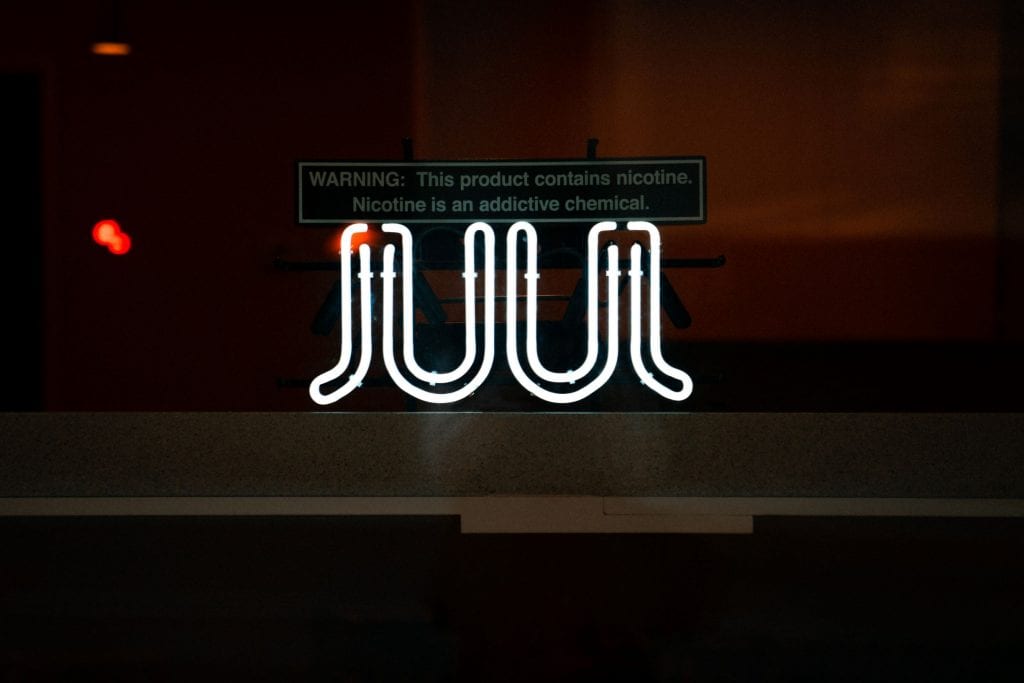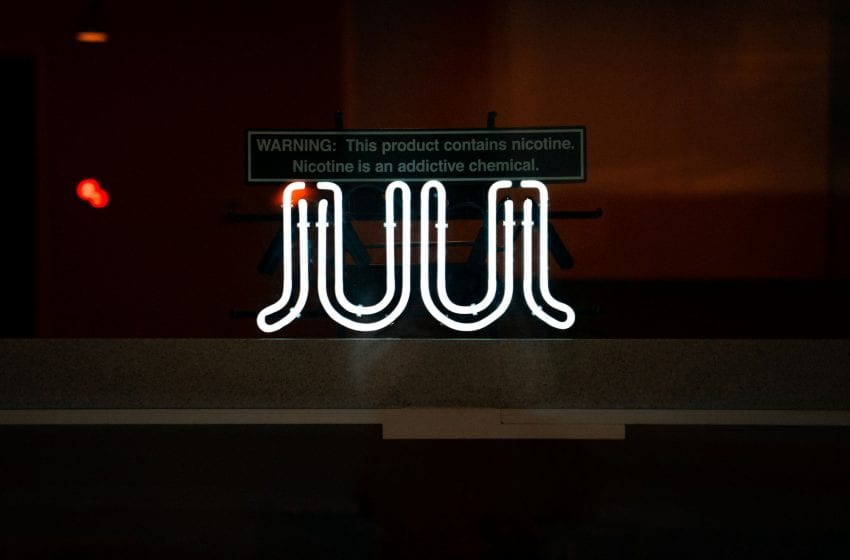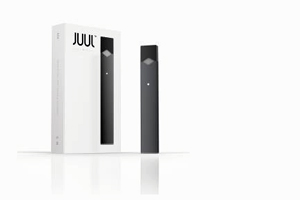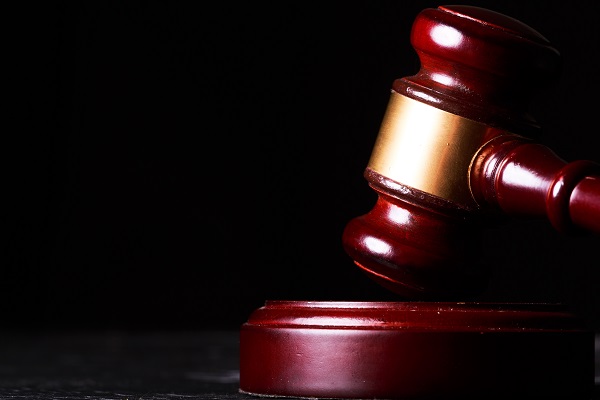Juul Labs’ patent infringement lawsuits against Ziip Lab are just the latest chapters in the vapor industry’s rich history of legal claims and counter claims.
By Maria Verven
It all started last fall when Juul Labs, the leading maker of e-cigarettes in the U.S., filed lawsuits against two dozen individuals and businesses alleging patent infringement. All 24 entities—including Ziip Lab, maker of ZPens and ZPods—make, sell or distribute pods that are compatible with the Juul vapor device’s pods.
Scores of defendants have already settled with Juul Labs, which is seeking swift resolution in several other actions in their quest to permanently eliminate “illegal products” from the marketplace.
Juul Labs then filed two patent infringement cases with the U.S. International Trade Commission (ITC), seeking to ban what it views as counterfeiters and purveyors of illegal plug-compatible cartridges from being imported or sold in the U.S. It also filed “mirror lawsuits” in 10 U.S. district courts.
Citing the fact that the products named in its complaint came onto the market in 2018, Juul Labs contends that they’re subject to FDA premarket review. (To date, no vapor product manufacturer, including Juul Labs, has submitted a premarket tobacco product application—PMTA—to the FDA.)
In March of this year, Juul Labs filed a design patent lawsuit in New Jersey against Ziip Lab. When the New Jersey judge denied Juul Labs’ preliminary injunction request, the company dismissed the complaint without prejudice. However, Juul Labs’ “mirror lawsuits,” and most notably its case before the ITC, are now heating up, with hearings scheduled in early August and later in September.
In June, Ziip Lab filed a lawsuit against Juul Labs in California Federal Court, accusing Juul Labs of falsely creating the impression that Ziip Lab wasn’t fighting the patent infringement case. A month later, Juul Labs filed a motion to dismiss Ziip Lab’s complaint. Among its arguments was that Ziip Lab’s action is a strategic lawsuit against public participation, and Ziip Lab failed to sufficiently plead any of its causes of action. This motion will likely be heard this fall.
This case could have huge implications for what’s becoming a very competitive industry. Let’s delve into the two sides of the story and then look at the larger implications.
THE JUUL LABS SIDE
Source: Ted Kwong, Juul Labs spokesperson
Juul Labs believes its intellectual property (IP) enforcement actions have merit and intends to litigate them aggressively. Similarly, Juul Labs believes the action Ziip Lab brought in June in Northern California has no merit and will vigorously defend itself.
Juul Labs is actively pursuing those involved in distribution and sales of infringing and potentially dangerous products (including the Ziip Lab entities), and it is enforcing its IP rights where possible. We are also communicating with government agencies to support their investigations of noncompliant products and are actively encouraging the agencies to ensure such products comply with regulations or are removed from the marketplace.
Juul Labs’ intellectual property enforcement actions focus on protecting investments in our valuable brands and many technological innovations. We will pursue any infringers that misuse Juul Labs’ intellectual property without permission as well as those that falsely imply association with Juul Labs.
Juul Labs is seriously concerned that “Juul-compatible” knock-off products are made with unknown ingredients under unknown quality and manufacturing standards outside of the U.S. This could pose potential health hazards for users and seriously damage the viability of this product category.
Many of these unregulated and potentially harmful products seem designed to target youth and are sold online without adequate age verification or limits on purchasing amounts. Indeed, just after Juul Labs voluntarily stopped the sale of nontobacco and nonmenthol flavored Juul pods—Mango, Fruit, Cucumber and Creme—to its traditional retail store partners last year, sales of these “Juul-compatible” knockoff products took off as they filled in the shelf space Juul Labs gave up. Many sell a much wider variety of flavors that have obvious if not deliberate youth appeal, such as “Pink Frosted Yellow Cakes,” “Berry Lemonade,” “Green Apple Candy,” “Sour Gummy Worm,” “Strawberry Milk” and “Cinnamon Roll.”
We believe Ziip Lab copied Juul Labs’ intellectual property in order to piggy-back on Juul Labs’ success. Moreover, we believe that their marketing efforts are designed to falsely imply association with Juul Labs in order to sell as many of their noncompliant and potentially dangerous “Juul-compatible” products as they can before the courts or the FDA stop them.
THE ZIIP LAB SIDE
Source: Steven Susser, intellectual property and business litigation attorney with Carlson, Gaskey & Olds, the law firm representing Ziip Lab
Ziip Lab’s position is that the Juul Labs patents are invalid under patent law because they relate to a simple device that was invented long before Juul Labs claimed to have invented it.
Ziip Lab is a Shenzhen, China-based manufacturer of high-quality, reasonably priced Juul-compatible pods. Started by an e-cigarette user who didn’t like the draw of the Juul pods, ZPens and ZPods were first developed in 2015 and on the market by early 2016.
Though compatible with a Juul pen or device, the ZPod is more cost-effective and has better airflow or pull than the Juul pod. ZPens and ZPods are now available online and in retail stores in over 20 countries, including the U.S., Mexico and Canada, and they will soon be available in Europe.
Juul Labs brought the whole e-cigarette industry under a microscope because of its marketing practices—practices that generated a call for a Senate hearing. We believe Juul Labs is trying to shift blame for its problems by attacking companies like Ziip Lab. Thus far, there have been no findings that Ziip Lab products infringe any Juul Labs patent.
Ziip Lab simply wants consumers to have a choice. Ziip Lab offers a high-quality but lower cost alternative to Juul’s replaceable e-cigarette pods. Ziip Lab believes it can coexist with Juul Labs and is asking the court to end Juul Labs’ improper anti-competitive behavior as it violates the law.
AN ENVIRONMENT RIPE FOR PATENT CLAIMS
Juul Labs and Ziip Lab are not alone in their patent battle. Earlier this year, the Ohio-based e-cigarette manufacturer Fuma sued British American Tobacco’s R.J. Reynolds Vapor Co. for patent infringement in federal court.
Fuma’s lawsuit states that R.J. Reynolds copied and used its design in its popular Vuse product—which has captured about 13 percent of the U.S. market, according to Nielsen numbers compiled by Wells Fargo analyst Bonnie Herzog. (For reference, Juul’s market is reportedly around 69 percent. However, online and vape shop sales are not included in this data.)
Fuma and R.J. Reynolds signed a confidentiality agreement in 2010 that allowed R.J. Reynolds to review Fuma’s e-cigarette designs as part of a potential investment or joint venture. Fuma is requesting a permanent injunction and unspecified damages. The case is still pending.
In 2014, Fontem Ventures, a Netherlands-based subsidiary of Britain’s Imperial Brand, sued 11 American e-cigarette makers in federal court on a range of patent infringements.
The year before, Fontem Ventures paid $75 million for the entire portfolio of global e-cigarette patents from Dragonite International Limited, a Hong Kong firm founded by Hon Lik, who is widely credited with inventing the modern e-cigarette. Lik, who now heads up Fontem Venture’s Chinese R&D team, sold his global patents for both new and core vapor technologies to Fontem Ventures, catapulting Fontem Ventures into the worldwide vapor market.
Lik was no dummy when it came to defending his concept. Although his original device used a piezoelectric ultrasound element (and not a lithium-ion battery as is used today) to vaporize nicotine solutions, Lik had registered and won patents based on the broader concept of an “aerosol electronic cigarette,” an “electronic atomization cigarette” and simply an “electronic cigarette.”
In 2016, Fontem Ventures filed four patent infringement lawsuits against R.J. Reynolds in federal court, defending Fontem Ventures’ 2013 patents for rechargeable e-cigarettes, cartridge refill packs, batteries and disposable e-cigarettes. In its response, R.J. Reynolds claims it had already developed internal e-cigarette technology.
In October 2018, Fontem Ventures and R.J. Reynolds finally reached a settlement. But because the terms of their agreement were undisclosed, it’s hard to know what precedent—if any—was sent to Juul Labs, American cigarette and e-cigarette giants Altria and Philip Morris, and the hundreds of other firms that hold their own e-cigarette patents. Simply Google “e-cigarette patents,” and you’ll find more than 600 patent citations.
Most would expect patent holders to respond by vigorously asserting their intellectual property rights. But that could mire the e-cigarette industry in patent infringement lawsuits—much like today’s smartphone industry has been.
Combine these time-consuming and costly lawsuits with the growing mountain of lawsuits against makers of Juul and other e-cigarettes on behalf of teens who have become “addicted to nicotine,” and you end up with a no-win situation.
The losers are not only the e-cigarette companies but also smokers who continue to hear nothing but bad news about a product that could greatly reduce the number of smoking-related deaths worldwide.






